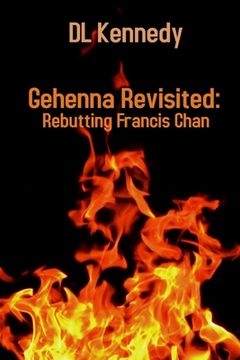Reseña del libro "Gehenna Revisited: Rebutting Francis Chan (en Inglés)"
"Gehenna Revisited: Rebutting Francis Chan" examines the Bible and endeavors to prove that eternal conscious torment in hell is not supported by scripture and does not exist in the original languages. The preponderance of scripture teaches annihilation. "Gehenna Revisited" covers old ground and new in the debate on hell. From the parallel Christ drew between Gehenna and the Battle of Armageddon, to the main point of the Parable of Lazarus and the Rich Man-if Hades existed, it would be filled with Pharisees-there are new considerations in this age-old discussion. Does God truly condemn His creation to eternal, conscious torment in hell, or have churches been teaching Greek Mythology for centuries? The book, "Erasing Hell", by Francis Chan and Dr. Preston Sprinkle, supports a more traditional view of hell and gives annihilationism a nod. "Gehenna Revisited" supports annihilation and discounts the traditional view of hell in total. This is not a point-by-point rebuttal of "Erasing Hell." This is a general rebuttal with an emphasis on Gehenna. Summary of the first argument in "Gehenna Revisited: " According to the law of first mention, the first usage of a word in scripture establishes its meaning; that meaning remains unchanged in the mind of God throughout scripture. The Bible says God is the same yesterday, today, and forever. He does not change. The Bible also says God is truth. Therefore, truth is the same yesterday, today, and forever. Truth does not change. And the truth is, in the beginning, God said the punishment for disobedience was death; "sheol" was the grave, and "Gehenna" was a valley outside of Jerusalem. If those things were true then, and truth is unchanging, then those things are true now. "Sheol" and "Gehenna," the primary words translated as "hell" in English translations, were never the mythological "Hades" of the Greeks. God forbade taking on the beliefs of the surrounding nations, and "Hades" is a Greek god and Greek mythology. If Jesus believed in the Hades of the Greeks, then He was guilty of taking on the beliefs of the surrounding nations, and that was something God forbade from the beginning. It was a grave sin. It was called adultery, and it was punishable by death. Not only did God condemn worshiping other gods and taking on the beliefs of the surrounding nations, He warned the Jewish people through Moses that those things would happen. When the Jewish Septuagint scholars translated "sheol" in the Hebrew Bible into "Hades" in the Greek translations, they introduced the concept of the mythological Greek Hades into the scriptures. Jesus constantly condemned the religious leaders for their false teaching. If Jesus was culturally corrupted, as the Jewish leaders of His day were, and believed in the Greek Hades, then He was not the eternal, unchanging God of the Old Testament. If He was culturally corrupted and believed in the Greek Hades, then He was guilty of the very thing He forbade in the Old Testament. He would have been guilty of taking on the beliefs and gods of other nations. That was something that was repeatedly condemned in the Hebrew scriptures as adultery, and it was punishable by death. Jesus would no longer be God, and He would no longer be a sinless sacrifice for sin, if He truly believed in the mythological "Hades" of the Greeks.

